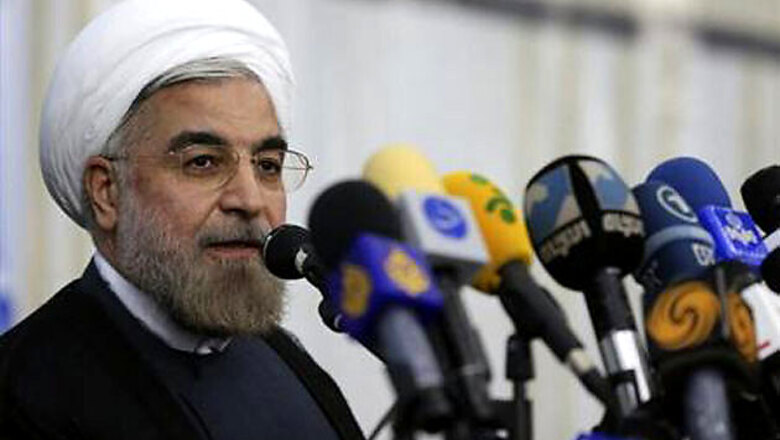
views
The surprise win by Iran's Hassan Rohani in weekend presidential elections offers a possible opening for resolving a dispute with the United States over Tehran's nuclear ambitions, U.S. officials and analysts said on Sunday.
However they cautioned that the moderate cleric does not wield the power to enforce changes. Iran's most powerful man, Ayatollah Ali Khamenei, remains its supreme leader and sets Tehran's nuclear policy. Any deal with the West would requires his endorsement.
The White House said on Sunday the election of Rohani, a mid-ranking Shi-ite cleric and former nuclear negotiator, is a "potentially hopeful sign" if he lives up to his campaign promises to "come clean" over the nuclear program.
The implications of the election for Iran's relations with the West are likely to come up in bilateral sessions this week as President Barack Obama heads to the Group of Eight summit in Northern Ireland.
While the election result was considered a rebuke of outgoing President Mahmoud Ahmadinejad's hardline policies that have led to international sanctions, it remains unclear whether Rohani's win translates to certain movement on the nuclear issue.
Rohani also faces many domestic challenges, above all an economy that is suffering due to soaring inflation and a weakened currency that analysts say are the result of international sanctions and economic mismanagement during Ahmadinejad's eight years in office.
Obama administration officials have long said the White House is serious about engagement with Iran to end concerns over its nuclear program, which Tehran insists is for peaceful purposes.
Since taking office in 2009 Obama has twice written directly to Khamenei offering him direct engagement, provided Iran shows it won't seek to develop nuclear weapons.
"If he (Rohani) is interested in, as he has said in his campaign, mending Iran's relations with the rest of the world, there is an opportunity to do that," Obama's chief of staff, Denis McDonough, told CBS' "Face the Nation".
"But to get to that point, we need him to live up to the obligation on the nuclear program and if he does I think there is a great opportunity for Iran and the people of that storied country to have the kind of future they would justifiably want," he added.
Russian Deputy Foreign Minister Sergei Ryabkov said in May that a new round of P5+1 nuclear negotiations with Iran is possible soon after the election.
CHIEF NUCLEAR NEGOTIATOR
The G8 talks will focus on Syria's two-year civil war. The United States has said it will arm Syrian rebels, a decision U.S. officials said was promoted by the increased involvement of Iran and Hezbollah in supporting Syrian President Bashar al-Assad.
Although Rohani, who was Iran's chief nuclear negotiator from 2003-2005, publicly criticized Ahmadinejad for his confrontational approach to the West, the cleric has made clear he is committed to Iran maintaining its atomic program.
According to a 2006 article by Chen Kane of Brandeis University, Rohani made clear that Iran should make as much technological progress as possible in order to "create a nuclear fait accompli."
"If one day we are able to complete the fuel cycle and the world sees that it has no choice, that we do possess the technology, then the situation will be different," Kane quoted Rohani as saying in 2006 about the pressure on Iran to abandon uranium enrichment.
Former Iranian nuclear negotiator Hossein Mousavian said Rohani's election "opens a new window for the P5+1 and Iran to work on a new era of cooperation rather than confrontation and to find a peaceful solution over Iran's nuclear dossier, face saving for both parties."
Others doubt if any deal can be struck while the 73-year-old Khamenei is alive.
"Those who want a deal can't deliver, and those who can deliver don't want a deal," Karim Sadjadpour, a leading Iranian-American expert on Khamenei at Carnegie, told Reuters.
Israel, a U.S. ally believed to harbor the Middle East's sole nuclear arsenal, has threatened to bomb Iranian nuclear sites if it judges diplomacy and sanctions meant to curb Iran's uranium enrichment program have failed.
After more than three decades without diplomatic relations, suspicions between Tehran and Washington run deep. Yet, a recent special report by Reuters showed that behind the scenes both sides have shown more interest in some kind of dialogue than commonly thought.
In his initial reaction to the election result, Secretary of State John Kerry urged Rohani to keep his election promises, putting pressure on the president-elect to show that he is serious about change.
"In the months ahead, he has the opportunity to keep his promises to the Iranian people," Kerry said in a statement.


















Comments
0 comment